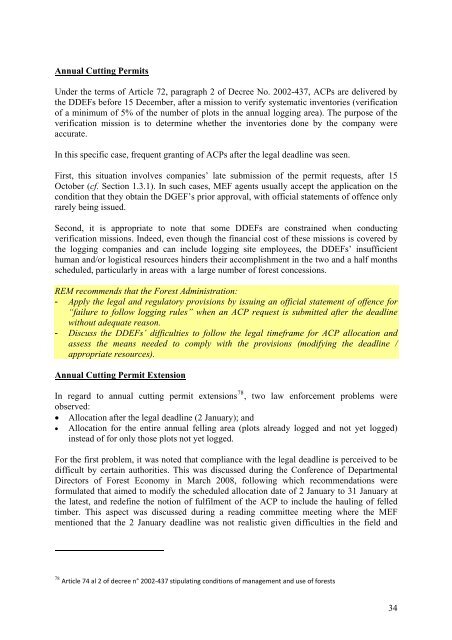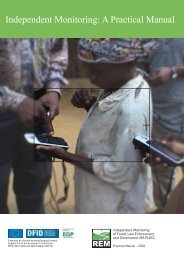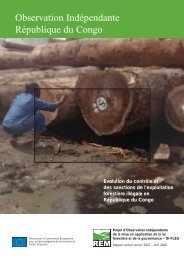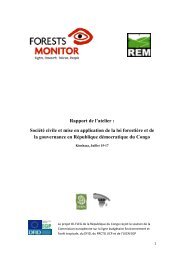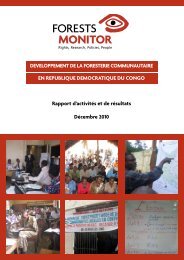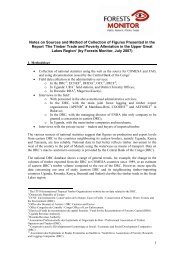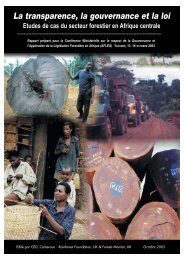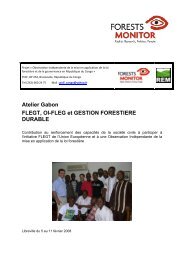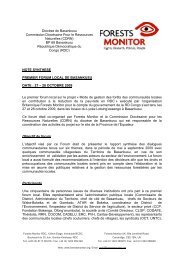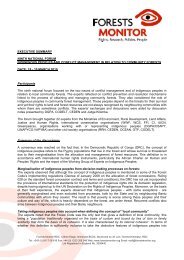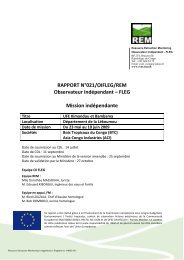REM Rapport Annuel No. 1 OIF Congo Brazzaville - Forests Monitor
REM Rapport Annuel No. 1 OIF Congo Brazzaville - Forests Monitor
REM Rapport Annuel No. 1 OIF Congo Brazzaville - Forests Monitor
You also want an ePaper? Increase the reach of your titles
YUMPU automatically turns print PDFs into web optimized ePapers that Google loves.
Annual Cutting Permits<br />
Under the terms of Article 72, paragraph 2 of Decree <strong>No</strong>. 2002-437, ACPs are delivered by<br />
the DDEFs before 15 December, after a mission to verify systematic inventories (verification<br />
of a minimum of 5% of the number of plots in the annual logging area). The purpose of the<br />
verification mission is to determine whether the inventories done by the company were<br />
accurate.<br />
In this specific case, frequent granting of ACPs after the legal deadline was seen.<br />
First, this situation involves companies’ late submission of the permit requests, after 15<br />
October (cf. Section 1.3.1). In such cases, MEF agents usually accept the application on the<br />
condition that they obtain the DGEF’s prior approval, with official statements of offence only<br />
rarely being issued.<br />
Second, it is appropriate to note that some DDEFs are constrained when conducting<br />
verification missions. Indeed, even though the financial cost of these missions is covered by<br />
the logging companies and can include logging site employees, the DDEFs’ insufficient<br />
human and/or logistical resources hinders their accomplishment in the two and a half months<br />
scheduled, particularly in areas with a large number of forest concessions.<br />
<strong>REM</strong> recommends that the Forest Administration:<br />
- Apply the legal and regulatory provisions by issuing an official statement of offence for<br />
“failure to follow logging rules” when an ACP request is submitted after the deadline<br />
without adequate reason.<br />
- Discuss the DDEFs’ difficulties to follow the legal timeframe for ACP allocation and<br />
assess the means needed to comply with the provisions (modifying the deadline /<br />
appropriate resources).<br />
Annual Cutting Permit Extension<br />
In regard to annual cutting permit extensions 78 , two law enforcement problems were<br />
observed:<br />
• Allocation after the legal deadline (2 January); and<br />
• Allocation for the entire annual felling area (plots already logged and not yet logged)<br />
instead of for only those plots not yet logged.<br />
For the first problem, it was noted that compliance with the legal deadline is perceived to be<br />
difficult by certain authorities. This was discussed during the Conference of Departmental<br />
Directors of Forest Economy in March 2008, following which recommendations were<br />
formulated that aimed to modify the scheduled allocation date of 2 January to 31 January at<br />
the latest, and redefine the notion of fulfilment of the ACP to include the hauling of felled<br />
timber. This aspect was discussed during a reading committee meeting where the MEF<br />
mentioned that the 2 January deadline was not realistic given difficulties in the field and<br />
78 Article 74 al 2 of decree n° 2002‐437 stipulating conditions of management and use of forests<br />
34


